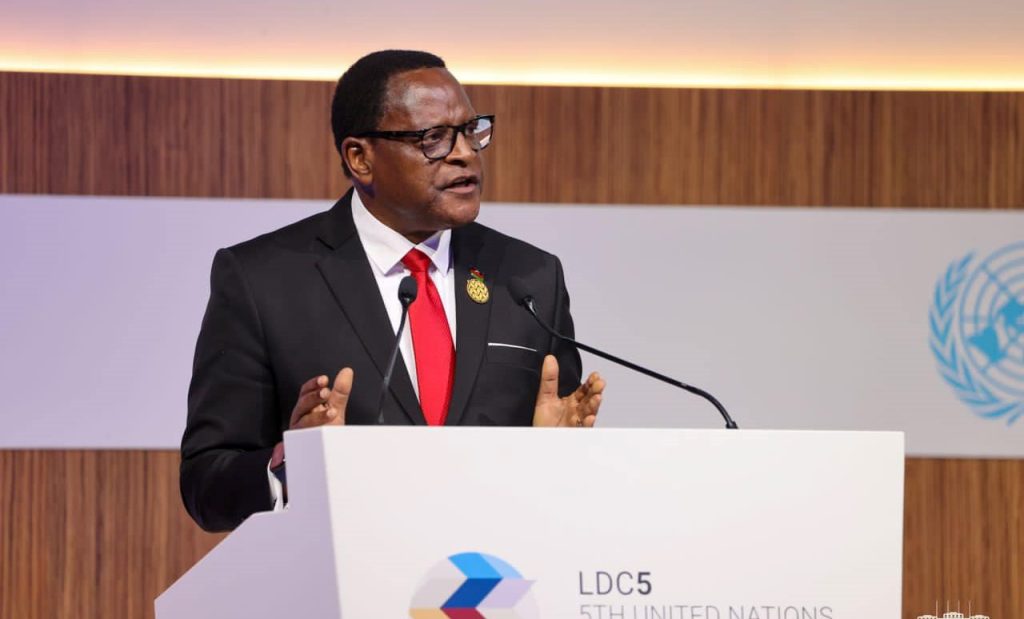Poor countries’ failure unacceptable—Chakwera
President Lazarus Chakwera says the graduation of Least Developed Countries (LDCs) to middle-income economies is non-negotiable and should be urgent as failure to do so will spell doom for the entire global economy.
Making his closing remarks to the Fifth United Nations LDCs Conference in Doha, Qatar as an out-going chairperson of the 46-member LDCs group, the President asked wealthy nations to play a part in assisting the poor countries to ensure attainment of Sustainable Development Goals (SDGs) expiring in 2030.

He said: “There is urgent need to support LDCs in their transition to middle-income status because it is not just for their own sake, but for the health and stability of the global economy as a whole.
“I, therefore, can’t emphasise this enough. The least developed countries must be the next to develop. This is non-negotiable. This is imperative. This is urgent.”
Chakwera is today scheduled to formally handover the chairmanship mantle to Nepal.
The meeting, which he chaired, has ended with bold commitments he said marked a transformative point for the world’s poorest countries whose development President Lazarus Chakwera says the graduation of Least Developed Countries (LDCs) to middle-income economies is non-negotiable and should be urgent as failure to do so will spell doom for the entire global economy.
Making his closing remarks to the Fifth United Nations LDCs Conference in Doha, Qatar as an out-going chairperson of the 46-member LDCs group, the President asked wealthy nations to play a part in assisting the poor countries to ensure attainment of Sustainable Development Goals (SDGs) expiring in 2030.
He said: “There is urgent need to support LDCs in their transition to middle-income status because it is not just for their own sake, but for the health and stability of the global economy as a whole.
“I, therefore, can’t emphasise this enough. The least developed countries must be the next to develop. This is non-negotiable. This is imperative. This is urgent.”
Chakwera is today scheduled to formally handover the chairmanship mantle to Nepal.
The meeting, which he chaired, has ended with bold commitments he said marked a transformative point for the world’s poorest countries whose development more prosperous and sustainable future,” she said.
Discussions during the LDC5 focused on delivery of the Doha Programme of Action for the LDCs for the decade 2022- 2031 which aims to manifest a new generation of renewed and strengthened commitments between the poor countries and their partners, including the private sector, civil society and governments.
The programme, agreed in 2022 after LDC5 was postponed due to the Covid-19 Omicron variant outbreak, outlines a transformative agenda to tap into the potential of the LDCs.
Measures include the development of a food stockholding mechanism for LDCs; an online university focusing on science, technology, engineering and mathematics (Stem) education, especially for women and girls; an international investment support centre; a sustainable graduation support facility; and comprehensive multi-hazard crisis mitigation and resilience-building measures for least developed countries.
There were 5 000 participants, including 47 Heads of State and Government and 130 Cabinet ministers and deputies.
Meanwhil e , Qatar has announced a financial package of $60 million for LDCs out of which $10 million is for supporting the implementation of the Doha Programme of Action and the remainder to help build resilience in the LDCs.
On the other hand, Germany has dedicated 200 million euros in new money in 2023 for financing of LDCs while Canada announced $59 million to deliver vitamin supplements in 15 LDCs and ecosystem conservation in Burkina Faso.
The EU Commi s s ion announced cooperation agreements advancing sustainable investments in Africa totalling more than 130 million euros of investment.
Under the theme ‘From potential to prosperity’, the conference aimed to drive transformational change to positively affect the 1.2 billion people who live in the LDCs.





